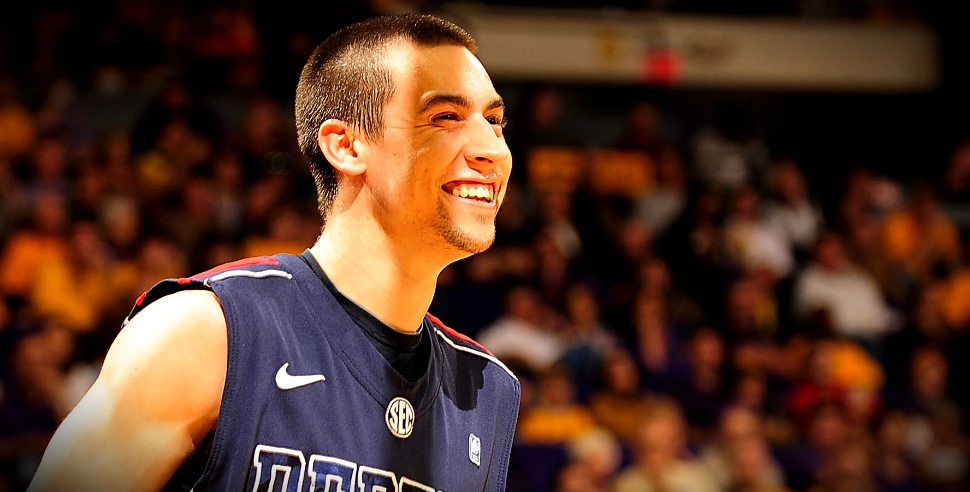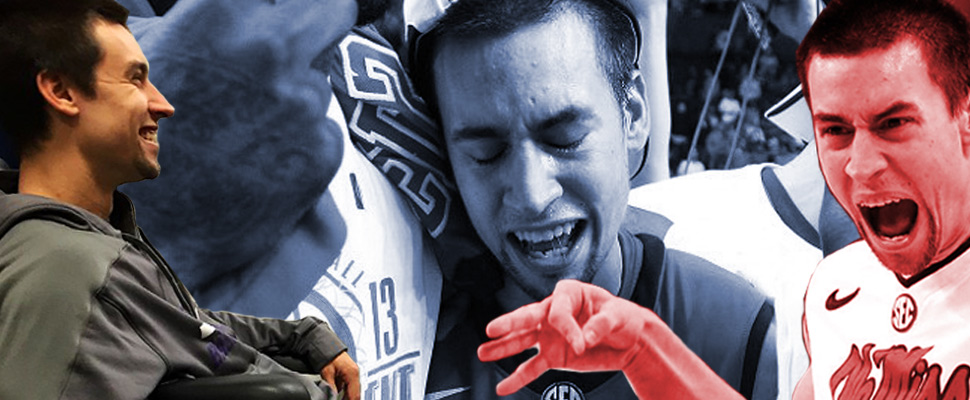
HURST, Tex. – There’s a plaque sitting on the desk of one of the assistant coaches inside the basketball office at L.D. Bell High School. It’s one of those things you could’ve picked up at an ESPN Zone a few years ago, or received as a gift at Christmas from someone who knew you liked sports, but didn’t exactly know what to get you. In bold lettering it reads, “Life is just the stuff that happens while we’re waiting for the game to start.”
Just a few feet away, leaning back in a chair with a huge smile on his face, in a Sacramento Kings sweatshirt and Ole Miss sweatpants, Marshall Henderson is still in the middle of all that life stuff. And he’s never in more danger than he is when he’s waiting for the game to start. That’s been the case since high school, and it still follows him to this rainy day in February.
“If it wasn’t basketball season,” Henderson’s father Willie, the head basketball coach at Bell, says, “oh my God. We always thought he’d wind up dead. Just the ride that he was on. He hung out with a lot of dumbasses and was one himself, and we were always worried. We’re still worried now, but not as much.”
Henderson stops by daily to see his dad and work out in the gym. It’s been a few months since he got back from playing for the Reno Bighorns of the D-League, and he’s trying to keep his mind and body occupied until the phone rings and he is told where to go next. His days aren’t complicated – and that’s not a bad thing – he sees his friends for lunch, goes to the lake to sit on a boat, watches the SEC Network constantly, plays basketball, and still goes out, occasionally, although not nearly as much as he used to.
It’s a big change, and a necessary one, from what Henderson quickly became known for in two highly-publicized and utterly self-destructive seasons at Ole Miss. The volatile and polarizing scorer had his moments of superstardom in Oxford and delivered some of the greatest moments in Rebels history.
The deep three-pointer at the buzzer to send Vanderbilt to overtime. The 6-0 start to SEC play. The shirt popping and taunting at Auburn. The Gator Chomp and win over Florida in the SEC Championship. The SEC Tournament MVP. The 12-seed upset of Wisconsin. The NBA Draft buzz. The general sense that everything was there for the taking for Marshall Henderson.
Owning It
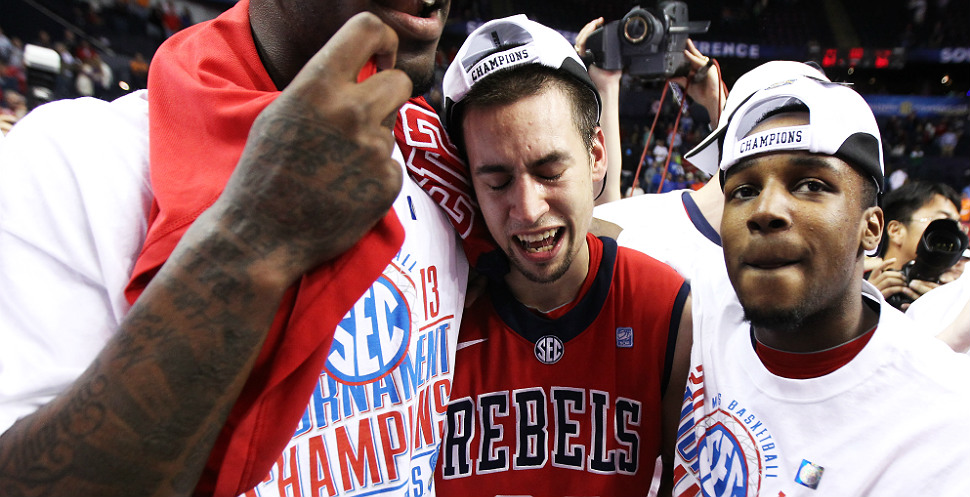
When his junior season ended, Marshall reverted back to being Marshall. And all that life stuff popped up again. He was pulled over in May of 2013, and police found trace amounts of marijuana and cocaine. Shortly after, he failed drug tests, and his college career was in jeopardy. The team and coach Andy Kennedy decided to give him another chance — if he went to a treatment center.
“One of the foundations we try to set with our guys is ownership,” Ole Miss coach Andy Kennedy says. “Just owning it, man. Not trying to make excuses or trying to run from it. We try to pound that into each and every one of our guys because it’s so fundamental in having an opportunity to be successful in life. You’ve just got to own it, the good and the bad, and Marshall’s always had that. There’s been so much drama surrounding him, and he had this meteoric rise. He was the lightning rod. That catapulted his image to another level, and he kind of basked in it and got caught up in the Marshall Mania. It’s hard to have perspective in those moments. Then there was that immediate step back after the season with some of the decisions he made.”
Henderson, who had done a school independent study at a rehab facility and studied addiction and recovery, and who had often spoke about becoming an addiction counselor later in life, was now faced with being a patient.
“I think that moment,” Kennedy says, “right before his senior year, is when he finally had to start owning who he was and what he’d done. That was when I really started to see the transformation.”
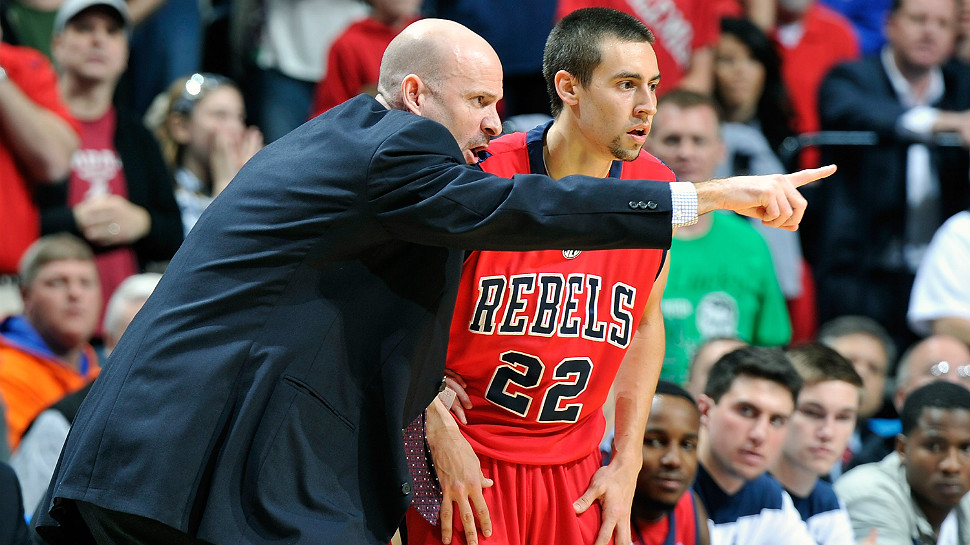
This was different from the arrest in 2010, when he and some friends were caught up in a counterfeit money scheme and got busted. Or from the 25-day jail stint in 2012 in which he violated his parole and tested positive for cocaine, weed, and alcohol. Each time, Henderson really believed he’d be back on the court eventually, and there’d be yet another chance.
Little did he know that those chances – at least from an NBA perspective – were drying up. Team personnel could look past the braggadocio, and one infraction, or even two, but rehab proved a pattern, and even though Henderson was just fine once the season rolled around again, the damage was done, and he ultimately went undrafted in 2014.
But Henderson doesn’t get wrapped up in that. Instead, he continues to focus on what rehab did for him. When he starts talking about rehab and about helping people, his words speed up, and his eyes flash. This is something he’s extremely passionate about, and something he thinks about constantly.
“I learned so much when I was there,” Henderson says. “It’s crazy being there, as compared to just studying it. I really do wish most of my friends would go for a month. Not that they’re that screwed up, but so they can learn. The two biggest things I took away from rehab were that whenever I stop playing basketball, I’d get focused on drugs and partying. When you just stop doing what you’ve always done and your life is changed and you’re spending all your money on it, and your focus is toward that, that’s when you have a problem. The second thing I learned is you have to be real with yourself. Most times the people who are there to help are the same people you’re scared shitless to talk to. My parents. My coaches. And the whole time, all they would’ve done was help. But when the mind’s fucked up, you don’t think things all the way through. If I’m ever doing whatever, I just need to catch myself. You can apply it with so many things. I was just able to learn you have to be real with yourself because it’s in our nature to be selfish and lie to ourselves about how things are going.”
It all goes back to owning it, and listening to those people around him who actually do want what’s best for him. In the social media era, we want Marshall Hendersons because they’re engaging and don’t immediately revert back to coachspeak or cliches. They give us a shiny object to make GIFs out of, and parse tweets and Instagrams, and if they crash and burn, we move onto the next one. But there’s a life after that fleeting fame, and an oftentimes complicated person behind the memes.
“One of the most awesome things about rehab is that the people who are helping you are screwed up, too,” Henderson says. “They’ve been there. They have the same problems. They’re not looking down on you or preaching at you.”
The same things that can make Henderson such a great basketball player on the court – the competitiveness, the ultra confidence, the refusal to back down – can get him into trouble, even when you take substances out of the equation. He’s taken shots at people on Twitter, and of course there were those comments right after Michael Sam was drafted. He claimed at the time it was part of a friend’s essay for a psychology class, and he says even today that paper is still on his computer, but that doesn’t make it any more tasteful or a better judgment call.
And that’s essentially the biggest risk you run when you’re as open online and in public as Henderson is. You’re always going to run the risk of offending people, or of people not getting the joke when it’s a goof, or not understanding intent if there’s something going on that folks aren’t privy to. It’s a tough line to tow, and there’s never going to be anyone excusing the behavior when things go wrong, or the prank doesn’t land.
Henderson has to be himself, and he can’t try and be someone he’s not, or it’ll all fall apart. He has to still be Marshall Henderson while avoiding the sort of things that came with being The Marshall Henderson in the first place. As his star rose, so did the expectation to play the role everyone wanted of him. To take pictures at a moment’s notice, to party into the late hours, to do shots or bumps with anyone who offered. He wouldn’t have gotten there if he didn’t have a reason to be known in the first place, but it was exactly those resulting behaviors that kept him from being an even bigger star.
The last thing Henderson needs is all that life stuff getting in the way while he’s waiting to play again.
Your Path Is Your Path
The conversation in the basketball office turns to Johnny Manziel. The former Heisman winner will soon be cut from the Browns. And he’ll later face a June docket hearing stemming from a misdemeanor assault charge levied against him by his former girlfriend, who accused him of striking her several times and threatening to kill her and himself in late January.
Henderson and Manziel, both Texas boys and SEC darlings, ran in some of the same circles, and it’s easy to see a comparison between the two, especially at the collegiate level. Their play was similar. Their party habits were similar. Even their personalities are similar.
“Man, and I thought you had issues,” Willie says of Manziel.
Marshall talked a lot about trying to get in touch with Manziel, to share some of the things he’s learned without being preachy. The way Henderson sees it, Manziel still has chances left, the ones that most likely aren’t going to come along for Marshall anymore (although he’s at peace with that).
One of Manziel’s close friends reached out to Marshall recently and told him to hit Manziel up to try and spread some positivity and words of encouragement, but Henderson wasn’t having it that way. He wants Johnny to come to him of his own accord, to want the help, to know he really means it.
“Me and Johnny were the same kind of character,” Henderson says. “I know one thing with him that really drives me crazy is how people are all up in his business all the time. I know from my own personal life that makes me nuts. His is on a so much bigger platform. I’m not close enough to figure out how to try and help him, but I just want to ask him what he thinks and how he views himself with all of this going down. If I could, I’d give him some words of encouragement, and let him know he can come around me. I’ve been able to figure out how to keep myself out of harm’s way, whether I’m being good or not. I can keep it to myself, and keep it to my close people, and not be out in public so much. With that, I’ve become a better person and don’t even care as much about going and doing stuff. In college, I’d want to be the man about town, but that stuff just doesn’t matter now. It’s exhausting.”
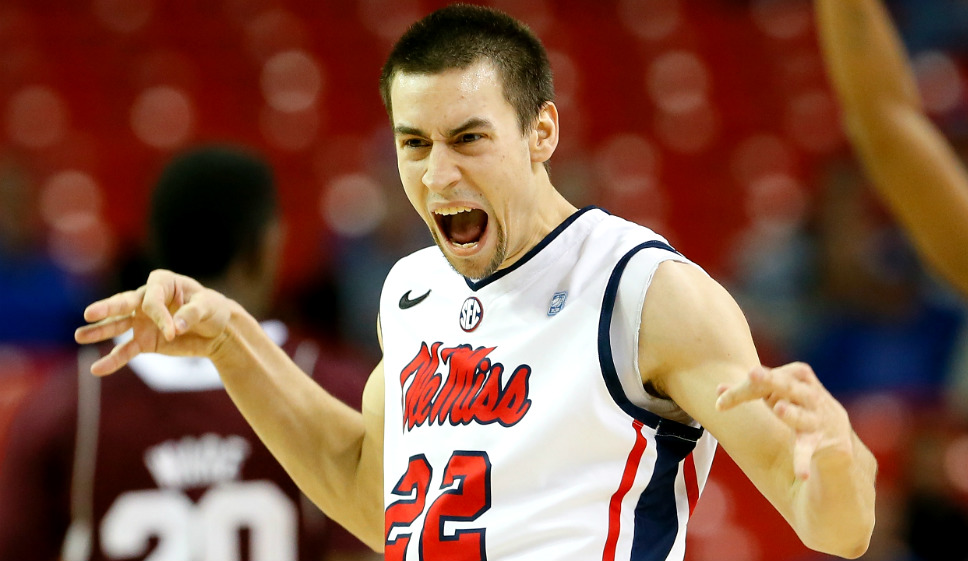
If anything, Henderson needs to save his energy for all the travel he’s doing. He’s already played in five countries – Iraq, Qatar, Morocco, Italy, and the United States – and as of early May, that number is going to go up. He signed on to be a member of a barnstorming American team that went out to China to play all the top squads in the league as a way to tune those teams up and showcase the players on the club for potential roster spots.
After he got home, he started finalizing a deal with an Italian team, and he’s optimistic that’ll lead to something bigger.
Both Willie and Marshall hope for different reasons that he’ll stick somewhere. Willie because he knows the structure of the season will keep Marshall on the right path. Marshall because he loves playing overseas and has it in his head that he wants to eventually become the most traveled international player of all time.
“I want to be the guy who plays in 30 countries when it’s all said and done,” Henderson says. “That’s something that has become very, very valuable to me is traveling while I play basketball. I’m not going to say I’d never go to the NBA now, but I just enjoy going and seeing the world and getting cultured. It’s opened me up so much, when I was in the Middle East, just seeing a different region and getting to see things people don’t get to see.”
After Marshall left school, he stayed in contact with the coaches and administrators at Ole Miss. They’d give him counsel in terms of things he’d have to think about, or if they had any resources he could utilize. He wrote Kennedy a letter when he was in the Middle East talking about that trip and the metamorphosis he was going through. He said he had really taken time on some of the decisions he made and what he was going to do moving forward.
“I was really proud seeing him transform his mindset into the potential we all saw in him,” Kennedy says. “There’s no doubt in my mind that he’s changed. One of the last conversations he and I had, I told him, ‘Man, your path is your path. We all have these grand plans, but in reality, the journey is going to be unpredictable.’”
Exiting The Dumbass State
After he got back from Iraq, Henderson earned an invite to the Sacramento Kings’ training camp. He didn’t make the team, but he took something away from the experience. He sat next to Caron Butler as much as possible, who was writing a book (Tuff Juice: My Journey from the Streets to the NBA, which came out in October of 2015) about his time in the league and everything it took to get there.
Henderson, despite being raised in a middle-class Southern Baptist family and competing in the state Bible Drill growing up, saw a lot of parallels between himself and Butler, and wanted to soak up as much knowledge as he could. Whether any of that truly sank in is anybody’s guess, but hopefully Marshall is getting out of what Willie calls “dumbass” state as he enters his mid-20s.
“He was raised right,” Willie says. “A lot of people in the basketball world see this college kid acting crazy and they don’t realize he was brought up the right way. A lot of that comes out of good natured stuff, but he just struggles with telling the other side, ‘you know what? I don’t do that anymore.’ It’s just frustrating when you think, sure, there are trials and tribulations that make us grow as people, but good lord, you don’t have to go to that extreme. You don’t have to be that radical to learn lessons, you know? We hope that the foundation we set for him, that he’ll come back to it. That’s what we keep hoping.”
Aside from wanting to become a drug counselor, Marshall has also discussed music production (he’s a huge fan of EDM and the positivity that comes out of those electronic festivals). But what he’s really stuck on recently is pulling together an outline for a memoir.
There’s no doubt there will be some stuff in there nobody’s read about before if he’s ever able to get it all written down. He’s alluded to anecdotes and certain moments, but he’s smart enough to tease without revealing so he can keep the juicy parts in the book. He’s planning on letting some stories loose (hopefully without incriminating anyone).
Henderson feels like a big part of it will be finding his spirituality again, and how that, plus what he learned in rehab, has brought him back to the path he wants to be on. He’s hoping that path leads him to the next game, and the next game, without getting him lost in the life stuff along the way.
“I’m not going to sit here and tell you I’ve changed my whole everything,” Henderson says. “I still screw up, daily. It’s a constant battle to try and fix myself. But there’s only been one person who was sitting with me in my jail bed. There’s only one person who was traveling with me in the Middle East. There’s only one person who was with me drugged out in my room with all the doors locked. It’s weird, but God has always been there to talk to. The only reason I’m still standing here is because I had the talent of basketball. People who don’t have that talent are locked away. I took all that for granted for too long.”
“I hope and I pray every day that I won’t wind up in another one of these stories. I want to be the story of success.”
